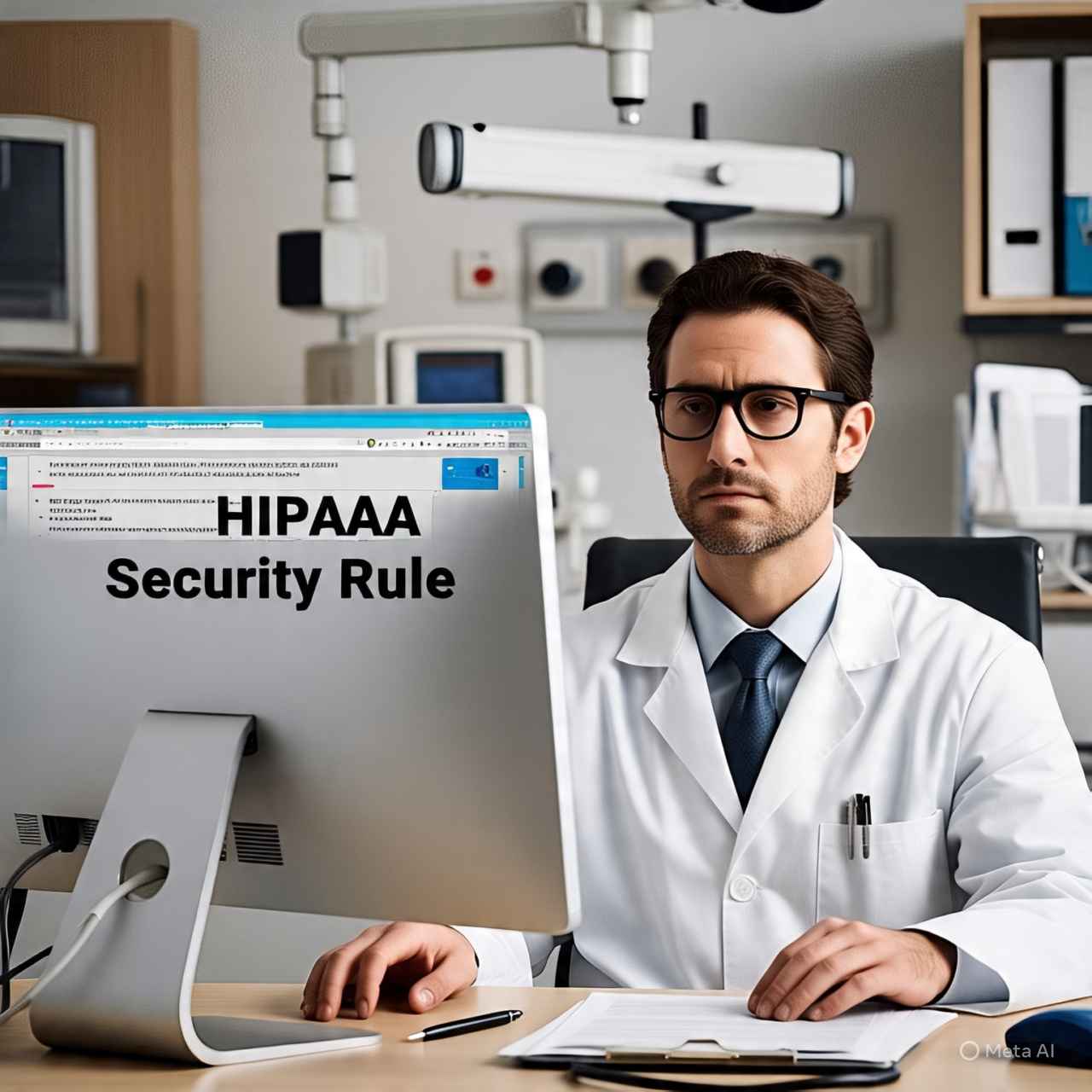What is the HIPAA Security Rule? Safeguards

The HIPAA Security Rule is a vital component of the Health Insurance Portability and Accountability Act (HIPAA), specifically focused on protecting electronic protected health information (ePHI). As healthcare providers, insurers, and business associates increasingly rely on digital systems, ensuring the confidentiality, integrity, and availability of sensitive patient data has never been more crucial.
This in-depth guide to the HIPAA Security Rule unpacks everything you need to know—clearly and confidently. Discover the three essential safeguards, learn the latest 2024 compliance requirements, and get practical tips to stay secure and audit-ready. Whether you're a healthcare provider, compliance officer, or IT lead, this blog equips you to handle ePHI safely and avoid costly mistakes in an increasingly regulated environment.
What Is the HIPAA Security Rule?
The HIPAA Security Rule is a set of federal standards issued by the U.S. Department of Health and Human Services (HHS) that requires covered entities and their business associates to protect ePHI—health data stored or transmitted electronically. While the HIPAA Privacy Rule governs how protected health information (PHI) is used and disclosed, the Security Rule HIPAA focuses specifically on how ePHI is secured from unauthorized access, tampering, or destruction.
Under the HIPAA Security Rule, all organizations that create, receive, maintain, or transmit electronic protected health information (ePHI) are required to implement administrative, physical, and technical safeguards to ensure the confidentiality, integrity, and availability of that data—protecting it from unauthorized access, breaches, and loss.
- Confidentiality: Preventing unauthorized access to patient information.
- Integrity: Ensuring that ePHI is not altered or destroyed in an unauthorized manner.
- Availability: Ensuring that ePHI is accessible when needed by authorized personnel.
Who Must Comply with the HIPAA Security Rule?
Compliance with the HIPAA Security Rule is mandatory for:
1. Covered Entities:
- Health Plans: Insurance providers, HMOs, Medicare, Medicaid.
- Healthcare Providers: Doctors, clinics, hospitals, pharmacies, and more.
- Healthcare Clearinghouses: Organizations that standardize health data for processing.
2. Business Associates:
Any third-party vendor or contractor who handles ePHI on behalf of a covered entity. This includes:
- Billing services
- IT vendors
- Cloud storage providers
- Consultants
- Data analytics firms
Medical records and diagnostic results stored in electronic health record (EHR) systems
The Security Rule specifically applies to electronic protected health information (ePHI)—any individually identifiable health information that is created, stored, transmitted, or received electronically. This can include:
- Patient medical records
- Lab results
- Billing information
- Insurance details
- Digital communications (emails, EHR entries)
Understanding what type of health information the Security Rule addresses helps organizations focus their security efforts on data most at risk.
The 3 Types of HIPAA Security Rule Safeguards
To secure ePHI, the Security Rule HIPAA outlines three key safeguard categories:
1. Administrative Safeguards
These are organizational policies and procedures designed to manage security measures and employee conduct:
- Conducting risk assessments
- Appointing a security officer
- Implementing workforce training
- Creating a contingency plan for emergencies
- Regularly evaluating security policies
2. Physical Safeguards
These controls limit physical access to systems and facilities where ePHI is stored:
- Securing facility access points
- Installing surveillance or badge entry systems
- Safeguarding workstations and devices
- Proper disposal of electronic media (hard drives, USBs)
3. Technical Safeguards
These involve the actual technology protecting data:
- Access control: Unique user IDs, passwords, and automatic log-off
- Encryption: Protecting ePHI during storage and transmission
- Audit controls: Monitoring access and usage
- Transmission security: Ensuring data is safe during network transfers
HIPAA Security Rule Requirements in 2024: Top 5 Essentials
1. Risk Assessment
Organizations must conduct thorough risk assessments to identify and address potential vulnerabilities in their ePHI handling processes. This is foundational to HIPAA compliance and must be reviewed regularly.
2. Workforce Training
Your team is your first line of defense. Training all employees on HIPAA security policies, recognizing phishing attacks, and reporting suspicious activity is essential.
3. Incident Response & Breach Notification
Organizations must have a formal process for detecting, reporting, and responding to security incidents. If a breach occurs, you are required by the HIPAA Breach Notification Rule to notify affected individuals, HHS, and possibly the media, depending on the breach size.
4. Audit Controls & Access Management
Use audit logs to track access to ePHI and restrict access based on job role. Only those who need ePHI to perform their duties should be granted access.
5. Documentation & Policy Updates
Proper documentation is not optional—it's a core requirement of HIPAA Security Rule compliance. Covered entities and business associates must maintain detailed, up-to-date records of all security-related policies, procedures, risk assessments, and breach response plans.
What Action Most Aligns with HIPAA’s Security Rule?
The most aligned actions with the HIPAA Security Rule include:
- Encrypting all ePHI at rest and in transit
- Limiting access based on job roles
- Conducting periodic risk assessments
- Providing HIPAA-specific training
- Keeping software updated and patched
These practices significantly reduce the risk of data breaches and demonstrate compliance during audits.
HIPAA Security Rule vs. Privacy Rule: What’s the Difference?
Many confuse the HIPAA Privacy Rule with the Security Rule, but they serve different purposes:
|
Feature |
Privacy Rule |
Security Rule |
|
Focus |
Who can access PHI |
How ePHI is protected |
|
Applies to |
All forms of PHI (oral, paper, electronic) |
Only electronic PHI (ePHI) |
|
Key Objective |
Control of data use/disclosure |
Protection from breaches |
|
Safeguards |
Administrative rules |
Administrative, physical, technical |
While they work together, understanding the difference between privacy and security in HIPAA is key for full compliance.
5 Tips for Easy HIPAA Security Rule Compliance
- Create Written Policies & Procedures
- Formal documentation is essential for audits and internal consistency.
- Formal documentation is essential for audits and internal consistency.
- Appoint a HIPAA Security Officer
- This person should oversee policy enforcement, training, and incident response.
- This person should oversee policy enforcement, training, and incident response.
- Limit Access to ePHI
- Use role-based permissions and monitor access logs.
- Use role-based permissions and monitor access logs.
- Train Your Workforce Regularly
- Ensure employees understand threats and how to avoid them.
- Ensure employees understand threats and how to avoid them.
- Perform Regular Risk Assessments
- Identify and fix vulnerabilities before they lead to breaches.
- Identify and fix vulnerabilities before they lead to breaches.
Keeping Up with HIPAA Security Rule Updates in 2024
HIPAA regulations continue to evolve in response to cybersecurity threats and healthcare innovations. To stay compliant in 2024:
- Monitor HHS updates and OCR bulletins
- Use compliance checklists and auditing tools
- Attend HIPAA compliance webinars or workshops
- Subscribe to HIPAA-focused newsletters
Proactive monitoring helps prevent violations and builds patient trust.
Final Thoughts: Why HIPAA Security Rule Compliance Matters
The HIPAA Security Rule is more than a regulatory requirement—it's a framework to protect the digital lifeblood of healthcare organizations. From safeguarding patient trust to avoiding massive fines, the importance of compliance cannot be overstated.
If your organization handles ePHI, now is the time to assess your safeguards, refine your policies, and empower your team with the knowledge and tools to keep data secure.
Articles
Build your awareness and get inspired with our researched articles on how you can strengthen your well-being
Contact Us
-
InspireWebApp
-
support@inspirewebapp.com
-
7600 Georgia Avenue Northwest, Washington, DC 20012, USA
Streamline Your Workflow with Inspire — Subscribe Now!
Join hundreds of healthcare professionals who trust Inspire to manage their documentation faster and more accurately.
Key Benefits
- ✅ Instant access to all tools
- ✅ Secure & HIPAA-compliant
- ✅ Designed for health Care providers
Popular Articles

Clear and Consistent Communication
By Zukane Mbuih

Enhancing Provider-Patient Interaction
By Zukane Mbuih

Improving Patient Experience
By Zukane Mbuih

Faster Clinical Documentation
By Zukane Mbuih